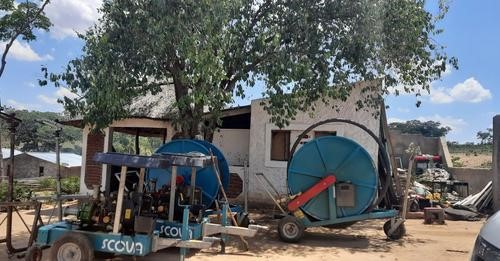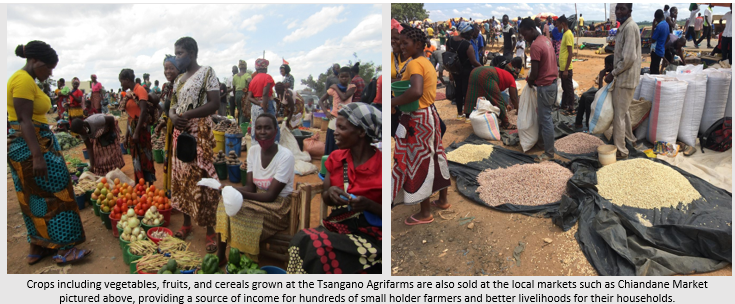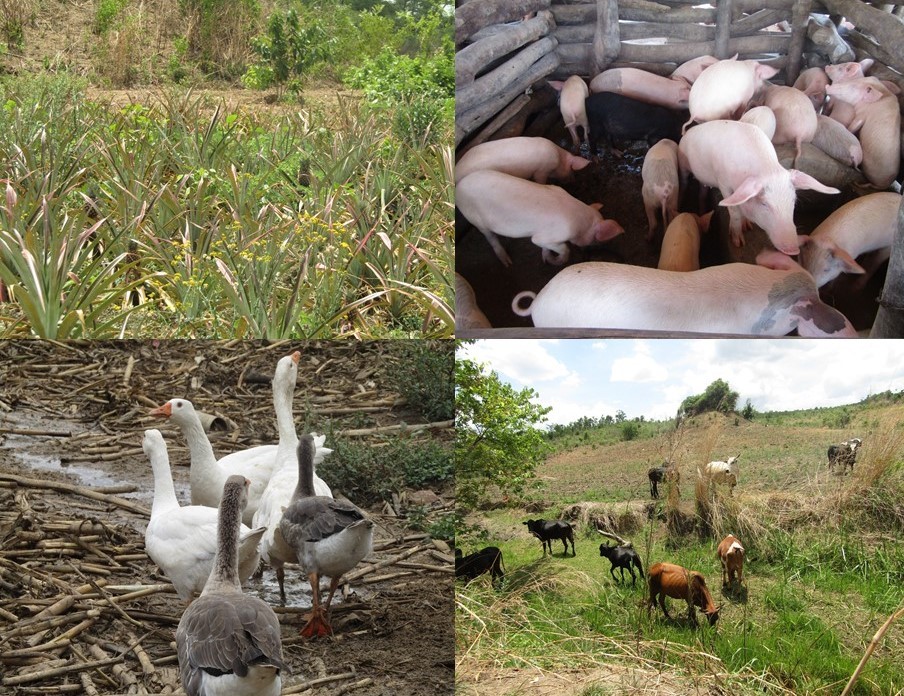
In November 2021 Tsangano Agrifarms LDA, an agribusiness company from Tete province became the second recipient of funding under the auspices of the BCI SUPER credit line implemented by BCI bank in partnership with UNIDO and FUNAE with funding from the Global Environment Facility (GEF), to install a 6.0kW solar photovoltaic system. The company is devoted to a diverse range of productive activities in the farm including agricultural production, agro-livestock, and agro-processing within 101 hectares of land in the Tsangano District, in Chinvano locality.
“Tsangano Agrifarms is an ambitious and credible project that contributes enormously to the development of the community. Besides the production of agricultural products, Tsangano Agrifarms is engaged in other productive activities like bee keeping, piggery, and fish farming. The company is enlarging its production, providing employment to the community thus increasing income generation opportunities”, said Mr. Geraldes José Mafumba, District Economic Activities Service Department, Tsangano.
Like other agricultural practices in Mozambique, the Tsangano Agrifarms activities depend on the increasingly dwindling water resources from nearby rivers and the rainy seasons to irrigate the farms and cater for poultry and animal husbandry.
“Due to climate change, we do not have abundant water for our own consumption and the irrigation of our fields. We have a nearby river, Rio Nhacuawa that flows only in the rainy season and whose water flow tends to reduce in the months of April-May” – lamented a Tsangano small holder farmer
In order not to suspend the agricultural activities due to water scarcity, the company resorted to pumping water from Liveranje River, which is 1.8km away. However, this requires significant investments that had to be made for the acquisition of motorized water pumps and piping of large capacities which makes operational costs very high for their level of production. “In the past we depended the old the water pumps whose engines function with diesel which is so costly and hard to maintain. The cost of maintenance is very high due to the fact that their spare parts are not existing in the Mozambican market”- Melody Stewart Dindingue, Tsangano Agrifarms CEO
With the support of the BCI SUPER credit line, Tsangano Agrifarms intends to use a photovoltaic system to harness the sun's energy to pump water to irrigate crops, power agricultural machinery and equipment, provide light, heat, and ventilation to farm buildings, haylofts, pigsties, livestock and energy for cooling in the horticultural processing factory and freezing in the abattoir chamber. Irrefutably, the operating costs of the company will reduce considerably due to the adoption of renewable energy systems compared to the fossil fuel powered equipment that is currently in use.
“We are going to install a solar submersible pump and assemble solar panels facing the sun to enable the pumping of water for irrigation of over 30 hectares of crops compared to the previous 10 hectares”- said Melody Stewart Dindingue and added “In addition, the photovoltaic systems also require much less maintenance compared to traditional agricultural energy sources and are very efficient. Greenhouse nurseries, for example, will allow crops to grow all year round. Solar energy will also be able to dry crops faster and more consistently compared to other methods.
Previously the agribusiness company used a diesel-powered mill to grind over 500 kgs of maize using 20 liters of diesel daily which is very costly and inaccessible due to the lack of petrol stations in the district to enable the purchase of the same. According to the company’s CEO installing a grinding mill that uses solar power is going to be of great advantage as it will not depend on expensive diesel. “The new solar powered grinding machine will have the capacity to produce 1000 kgs of maize flour per day”, said the Company’s CEO.
The Tsangano Agrifarms solar photovoltaic system with funding from the BCI SUPER credit line will enable crop production throughout the year, maize grinding benefiting 250 families (equivalent to 600-800kg of flour per day), and increase poultry and piggery production from the current 79 to 600 per year.

Besides increasing production, the solar system will enable the use of better heating and lighting methods that are not detrimental to the environment. In the past the warming of poultry houses was done using firewood, a practice quite detrimental to the environment, but with the solar-powered system, solar panels and inverters will be placed on top of the poultry houses to offer lighting and heating to the birds.
Above and beyond the solar photovoltaic system for irrigation, Tsangano Agrifarms will venture into other uses of renewable energy like biomass owing to abundance of animal and crop waste in the company’s farms. “The chicken and pigs waste have significant methane content relevant for the generation of biogas when decomposed” Mr. Vicente Matsinhe, National Coordinator, TSE4ALLM project, UNIDO

“The fund received from UNIDO will cover our needs as regards to enabling the irrigation of crops throughout the year using the solar photovoltaic system, hence more production. It is expected that in a period of 1-year Tsangano Agrifarms will employ over 150 community members” stated Mr. Melody.

